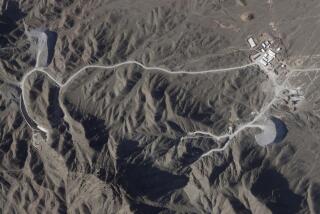Syria-N. Korea nuclear link seen, diplomat says
- Share via
WASHINGTON — Western governments have concluded that Syria and North Korea were collaborating on a nuclear weapons program at a mysterious site in the Syrian desert that was bombed by Israel last year, a senior European diplomat said Wednesday in a rare comment about the episode by a high-ranking official.
The diplomat said that after a review of available intelligence, Western governments have reached “some sort of common ground . . . that there seems to have been cooperation between Syria and North Korea” at the site. The official’s remarks were made on condition of anonymity because of the sensitivity of the subject
Since the Israeli bombing in September, U.S. and allied officials have said little about the attack, the site or the possible existence of a Syrian nuclear weapons program, which could further destabilize the turbulent Middle East. Officials at the CIA and the State Department declined comment again Wednesday.
But the European official’s remarks represented both an acknowledgment of the attack and the conclusion of Western governments that the site was a nuclear installation. Before Wednesday, leading Americans, Israelis and Western allies had avoided addressing either issue.
An international consensus that the governments in Pyongyang and Damascus have collaborated on nuclear weapons would mark a new setback to U.S. efforts to entice North Korea to scrap its nuclear armament program. It also could blunt efforts to pursue engagement with Syria, after apparent U.S. overtures before November’s Mideast peace conference in Annapolis, Md.
Yet some observers have remained skeptical that the Syrian structure was part of any nuclear program.
Mohamed ElBaradei, director-general of the International Atomic Energy Agency, the U.N. nuclear watchdog, has said that on the basis of satellite photos, IAEA experts believe it unlikely the site housed a nuclear reactor. ElBaradei’s comments came in a Jan. 8 interview with the Arabic-language newspaper Al Hayat.
Syrian officials have said repeatedly that the building was not a nuclear installation but an empty military structure. Israeli officials have acknowledged the attack in vague terms but have provided no detailed information concerning the site.
U.S. allies acknowledge that the evidence of weapons activity could be stronger.
The European diplomat acknowledged that the available intelligence is “not as much as we would love to have about that.”
He also said it was not clear how far along the Syrian effort was, or what the Syrian government is doing now at the site.
There have been some signs of rebuilding at the site, on the banks of the Euphrates in eastern Syria. Recent satellite photos by a private Colorado firm, DigitalGlobe, show a new building on part of the site, based on photos kept on the firm’s website. However, private analysts said it was unlikely the Syrians would try to duplicate facilities destroyed in the Israeli attack.
The European diplomat said it was “possible” that the structure that seems to be under construction at the site was being built simply to conceal the nature of past activities.
David Schenker, a former Pentagon specialist on Syria now at the Washington Institute for Near East Policy, said a general agreement among Western governments that North Korea and Syria collaborated at a nuclear site would be “a pretty significant development.”
There has been wide agreement that North Korea has helped Syria on its arms program. Pyongyang helped Damascus build Scud missiles, the crude, short-range weapons used by Iraq in the 1991 Persian Gulf War, as well as more advanced designs, Schenker noted.
Syria has sought to buy nuclear reactors in years past from several countries, including Russia, analysts say. International officials know of only one small reactor operating in Syria, a 30-kilowatt Chinese-supplied plant at Dayr Al Hajar. .
ElBaradei, in his Al Hayat interview, said IAEA officials would like to examine the Syrian site but have so far been barred by Damascus. Syria is a signatory to the Nuclear Nonproliferation Treaty, which allows for periodic inspections of declared nuclear materials and activities.
U.S. officials have asked North Korea whether it has worked with Syria on a nuclear program; the North Koreans have denied it.
As part of the ongoing denuclearization talks between North Korea and five international powers, U.S. officials are awaiting a formal declaration of Pyongyang’s nuclear activities, including any nuclear collaboration with Damascus. North Korea, however, has said it plans no further disclosures, jeopardizing what had been considered a promising deal.
The potential warming between U.S. and Syrian officials already had begun to encounter strains.
After hints of progress last fall, friction has developed recently over Lebanon’s selection of a new government. U.S. officials are unhappy with what they consider Syrian meddling in the process.
On Tuesday, as President Bush toured the Middle East, a bomb exploded near a U.S. Embassy convoy in Beirut, killing three people and injuring more than 20, including two U.S. Embassy employees who are Lebanese.
Schenker said the bomb may have been intended as a warning from Syrian-supported militants to U.S. officials.
--
Times staff writer Greg Miller contributed to this report.
More to Read
Sign up for Essential California
The most important California stories and recommendations in your inbox every morning.
You may occasionally receive promotional content from the Los Angeles Times.














